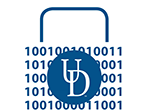
|
|
It’s October, a.k.a. Cybersecurity Awareness Month!
Cybersecurity Awareness Month, celebrated annually in October, is a global initiative aimed at raising awareness about the importance of protecting personal and organizational data from cyber threats. It serves as a platform to educate individuals, businesses, and governments about best practices for online safety and security Learn about Cybersecurity Awareness Month, why it’s important to UD, and how you can get involved.
Delaware Library Ransomware Hack: what you need to know
On Friday, September 20th, Delaware state library computer systems were compromised and taken offline due to a ransomware attack. No details are available yet as to the identity or whereabouts of the attackers, but the FBI is actively investigating the incident. Meanwhile, the state has promised not to pay any ransom and will rebuild the servers from backups. This attack comes as public governments, networks, and libraries are suffering increasing cyber attacks. All internet and public-access computers in Delaware state libraries were affected—however, no services or systems at UD have been compromised. Here’s what you need to know about the attack—and how to stay alert.
An increase in phishing attempts at the University
We’re seeing more sophisticated phishing attacks targeting the entire University community— including faculty, staff, students, and alumni—with alluring messages designed to deceive you into revealing sensitive information. From websites cloning the University’s login page to scammers impersonating UD officials, the cyber threat environment is intensifying with enhanced tactics and spreading to new modes of communication.
The Phish Alert Button (PAB) has been implemented!
On September 3rd, IT Security implemented the Phish Alert Button (PAB) through our security awareness and phishing platform, KnowBe4. The PAB is enabled for both Gmail and Outlook and provides users a quick and safe way to report suspicious emails. If you do not see the PAB in your email client, or you need assistance, please reach out to us at secadmin@udel.edu. There are a few changes from last year’s training, so here is what you can expect. 2024-25 Security Awareness Education is now available If you are required to take the 2024-25 Security Awareness Education, you would have received an enrollment email on Sept 9th. By completing this training, you are helping UD reduce the risk of data breaches, malware infections, phishing attempts, and other malicious activities. This knowledge will help you keep your data and UD’s data safe. In addition, when you complete the training you’ll be entered into a drawing for prizes at the end of each training period. There are a few changes from last year’s training, so here is what you can expect. 2024-25 Security Awareness Education is now available If you are required to take the 2024-25 Security Awareness Education, you would have received an enrollment email on Sept 9th. By completing this training, you are helping UD reduce the risk of data breaches, malware infections, phishing attempts, and other malicious activities. This knowledge will help you keep your data and UD’s data safe. In addition, when you complete the training you’ll be entered into a drawing for prizes at the end of each training period. There are a few changes from last year’s training, so here is what you can expect. The Clery Act and this month’s featured cybercrime The Clery Act, or the Jeanne Clery Disclosure of Campus Security Policy and Campus Crime Statistics, is a federal statute passed in 1990 that requires Universities receiving federal financial aid to produce reports and broadcast timely information about crime on and around their campuses. This Cybersecurity Awareness Month, we discuss UD’s Emergency Notification Policy and how it addresses the need to provide accurate and timely information to the campus community and public. We’re also focusing on sextortion—a range of crimes that involve criminals coercing victims into producing personally explicit images—which in recent years has seen an alarming rise around the world with drastic consequences. Know how to stay informed about cybercrime and where to find help resources and crisis support. 
|
|
|
QUESTIONS ABOUT THIS EMAIL?
https://www.udel.edu/security |
